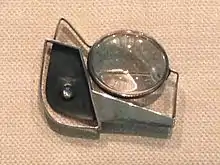Margaret De Patta
Margaret De Patta (née Strong; 1903–1964) was born in Tacoma, Washington,[1] and grew up in San Diego, California.[2] She died in Oakland, California.[3] She was an American jewelry designer active in the mid-century jewelry movement.[4] Her innovative jewelry was influenced by the "Bauhaus school, constructivism, and democratic ideals".[5] Her work is collected in many major museums including the Smithsonian American Art Museum,[6] the Los Angeles County Museum of Art,[7] and the Oakland Museum of California.[8] The first major retrospective of her work, Space-Light-Structure: The Jewelry of Margaret De Patta, opened at the Museum of Arts and Design in 2012.[4] The Velvet da Vinci gallery in San Francisco showed some of her works in "The De Patta Project: New Jewelry Made With Old Stones Acquired from the Estate of Margaret De Patta (1903-1964)."[9]

Career
De Patta first began experimenting with jewelry in 1929 when she made her own wedding ring.[10][11] She was known for her innovative use of visual effects in her jewelry, such as light refraction, image reflection, and magnification, which she achieved through the design of her stones.[12] She called her stones "opticuts".[12]
She struggled with her fourth husband, industrial designer Eugene Bielawski, to start a reasonably priced jewelry line for the public.[13][14]
Education
In 1926, De Patta received a scholarship to attend the Art Students League in New York, where she encountered the work of the European avant-garde.[4] She later returned to San Francisco and taught herself the art of jewelry-making.[4]
In 1941 she studied under László Moholy-Nagy at the School of Design in Chicago, Illinois.[4]
References
- "The Transcendent Jewelry of Margaret De Patta: Vision in Motion | Art Jewelry Forum". artjewelryforum.org. Retrieved 2019-03-28.
- "The First Major Retrospective on Margaret de Patta, a Seminal Figure in the Studio Jewelry Movement, Opens at MAD in June". madmuseum.org. Retrieved 2019-03-28.
- "Margaret De Patta". Smithsonian American Art Museum. Retrieved 2019-03-28.
- "The First Major Retrospective on Margaret de Patta, a Seminal Figure in the Studio Jewelry Movement, Opens at MAD in June". madmuseum.org. Retrieved 2017-03-16.
- "Groundbreaking Jeweler: Margaret De Patta | American Craft Council". American Craft Council. Retrieved 2017-03-16.
- "Ring by Margaret De Patta / American Art". www.americanart.si.edu. Retrieved 2017-03-16.
- "Margaret De Patta | LACMA Collections". collections.lacma.org. Retrieved 2019-03-18.
- "Margaret De Patta Jewelry | Oakland Museum of California". museumca.org. Retrieved 2017-03-16.
- Kahn, Eve M. "Cultivating a Love of 'Lover's Eyes': [Movies, Performing Arts/Weekend Desk]". New York Times.
- "Women who paved the way: Margaret De Patta | | the jewelry loupe". thejewelryloupe.com. Retrieved 2018-03-22.
- Keith, Kelsey. "Imagine if Moholy-Nagy Made Jewelry". Dwell. Retrieved 2018-07-09.
- GREENBAUM, TONI (1998). "Constructivism and American Studio Jewelry, 1940 to the Present". Studies in the Decorative Arts. 6 (1): 68–94. doi:10.1086/studdecoarts.6.1.40662662. JSTOR 40662662.
- Lauria, Jo. "Margaret De Patta: Pioneer of Modern Studio Jewelry". ProQuest. 35. ProQuest 1173302507.
- "Compulsion for Detail". New York Times. 3 February 2012 – via ProQuest Historical Newspapers.